Free shipping for all orders over 30 euro!
-
Shop
- Insights
-
About ROMBO
- Dealers
- Guitar Pick finder
- Gift Card
+Categories
- accessories
- bass
- bass pick
- bass picks
- bass plectrum
- bass plectrums
- beginner
- bright tone
- chose guitar pick
- chose guitar picks
- chose plectrum
- chose plectrums
- CrystalBright
- Diamond
- Diamond pick
- discipline and guitar
- DIY generation
- durability pick
- durable pick
- eco
- ecoblack
- find guitar pick
- find plectrum
- fingers vs picks
- grip
- grip guitar pick
- guitar accessories
- guitar advantages
- guitar benefits
- guitar career
- guitar health
- guitar injury
- guitar learn
- guitar lesions
- guitar lesson
- guitar method
- guitar noise
- Guitar noise plectrum
- guitar pain
- guitar pick
- guitar pick beginner
- guitar pick bevel
- guitar pick buy
- Guitar pick diamond
- guitar pick durability
- guitar pick durable
- guitar pick eco
- guitar pick features
- guitar pick grip
- guitar pick material
- Guitar Pick Noise
- Guitar Pick online
- guitar pick recycled
- guitar pick recycled material
- guitar pick special features
- guitar pick textures
- guitar pick thickness
- guitar pick variable thickness
- guitar picks
- guitar tone
- guitar warm-up
- guitarpick
- guitarpicks
- hold a guitar pick
- hold guitar pick
- hold guitar picks
- hold pick
- hold plectrum
- hold plectrums
- how to
- how to chose your guitar picks
- jazziii
- learn guitar
- lose guitar pick
- material
- materials
- mental health and guitar
- motivation and guitar
- music
- not to lose guitar pick
- Online guitar
- online guitar pick
- online guitar pick buy
- pick
- pick durability
- pick material
- pick noise
- Picks
- picks vs. fingers
- play bass fingers
- play bass picks
- play bass with fingers
- play bass with pick
- play bass with picks
- play bass with plectrum
- play guitar faster
- plectrum
- plectrum attributes
- plectrum beginner
- plectrum bevel
- plectrum characteristics
- plectrum features
- plectrum grip
- plectrum material
- plectrum noise
- plectrum recycled
- plectrum shape
- plectrum variable thickness
- plectrums
- Plek
- pua
- recycled
- recycled guita pick material
- recycled guitar picks
- recycled picks
- recycled plectrum
- Rombo Diamond
- rombopicks
- tendonitis guitar
- the guitar pick
- tone
- variable thickness
- warm tone
- warm-up guitar

Picks vs. Fingers for Playing Bass Guitar
You have probably heard this question many times: Should I use a pick or my fingers to play bass? You can find a huge amount of different answers on the Internet and still be confused.
My philosophy is, to never limit yourself. Both methods are valid and appropriate for the right musical context.
Picks vs. Fingers: The Eternal Debate
Whether using picks or using your fingers, each technique has its place and, ideally, you need to feel comfortable with either one you choose.
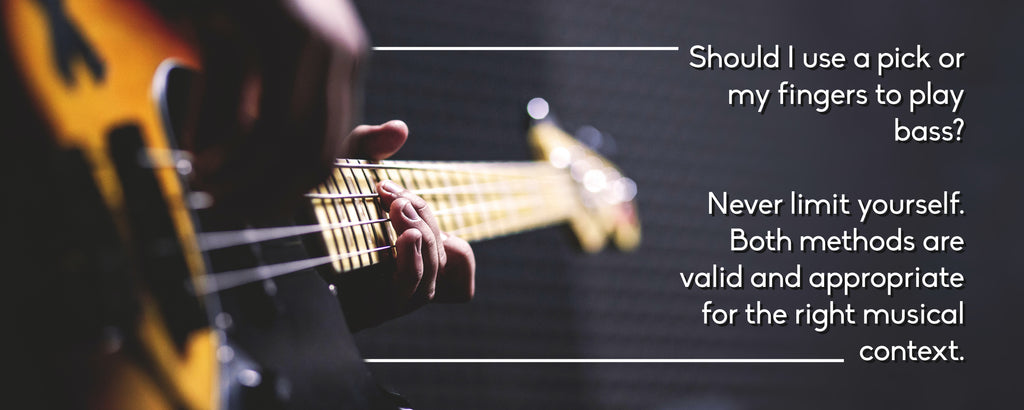
Is there a wrong way to play an instrument? Any method you use to get sound out of your instrument - fingers, pick, nails, palms of your hands, etc - can work, if the sound produced is the sound you are looking for. It is entirely a matter of personal preferences.
Therefore, this is an unimportant debate, if your plan is to be a versatile musician, and be able to understand the rich parts of every bass line, regardless of the method used to play them.
For me, it is difficult to understand how this debate has been one of the most controversial topics since the advent of modern music creation decades ago.
Why not keep an open mind and become comfortable with both methods? There is room for everything.
Using Fingers to Play Bass
Usually, bass players report having more control when using their fingers, giving them a richer tonal variety, and beefier tone. In Addition, the popular slap technique used by many bassists can be easily implemented, if you don’t hold any pick between your fingers.
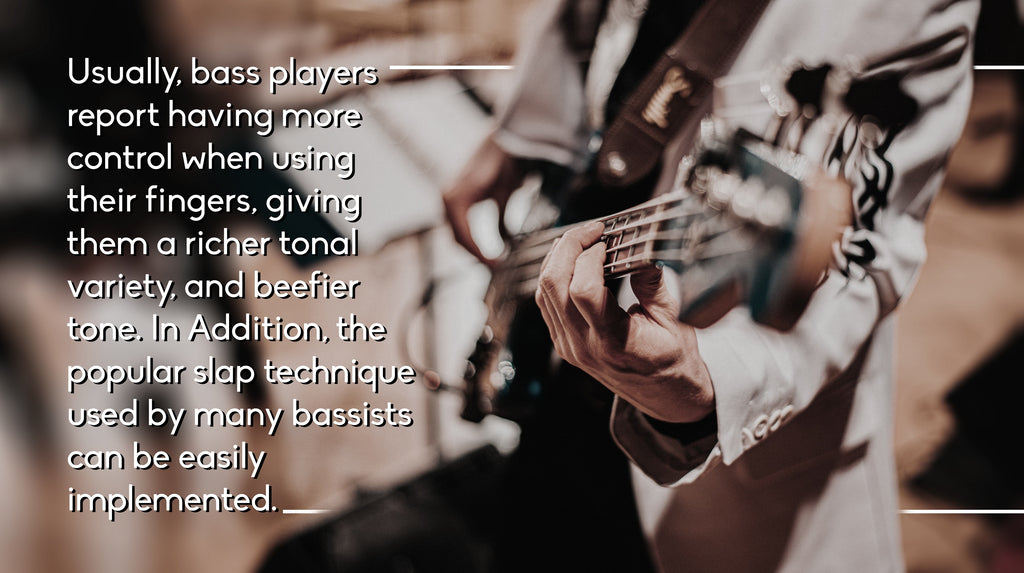
A funny positive argument is, that you will never lose your bass pick if you don’t own one.
One of the drawbacks of this method is that it takes a little more work to learn. Nevertheless, if your goal is long-term learning, this should not be a technical obstacle.
Using Picks to Play Bass
The biggest advantage of using a pick for the bass guitar is obvious: Instant speed. You can develop speed more quickly and effortlessly.
If the bass lines you want to learn, belong to certain music styles that are speed intensive, a pick might make sense. You can develop the same speed as with your fingers, but it will take much more time.
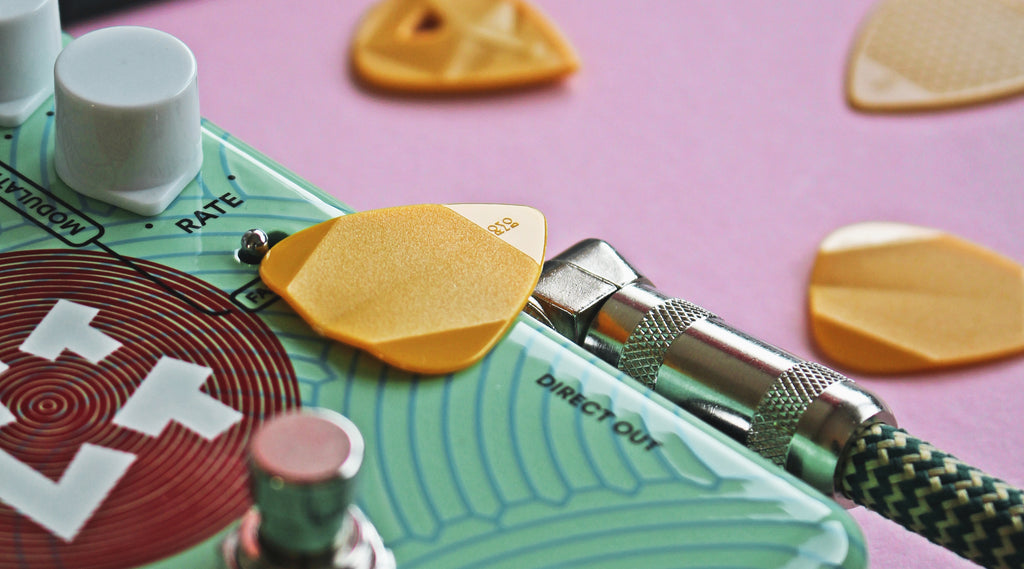
In addition, the tone can be easily changed by using a different guitar pick. This allows you to have different tones, and experiment a lot to find the right sounding bass guitar pick.
Every pick - for guitar, bass, or other instruments - has four different main parameters: Shape, material, thickness, and size. Combined together, they result in a very specific range of tone textures, attack soundwaves, and feedback. Therefore, choosing your guitar pick is one of the most difficult tasks. We have created a guide HERE, that will help you find your tone.
Pick Thickness for Bass Players
Bass players generally use thicker picks. The thickness improves the bass playing control, and the overall tone of the string.
The average pick thickness for bass players is 1.17 mm, while for guitar players is 0.89 mm. Remember, bass strings are much thicker than guitar strings. Therefore, a thinner plectrum will give you much less control in comparison to a thicker plectrum.
The size of the pick will also have a role in the creation of the tone.


Having said that, there are still many bassists who do prefer to use thinner bass picks, like for example Rombo Classic, or Rombo Origami.
If you have no idea where to start, take the average value and look for picks with a gauge of about 1.2 mm. This is a good place to get started. From there, you can go up and down and try other picks depending on your preferences. It might be a good idea to look for the bass picks your favorite players use, and try to understand why they do so.
Most Popular Pick Shapes for Bass:
The truth is, most classical shapes tend to have an excellent reception between the bass players.
The most popular shapes are the classical teadrop pick shape, the rounded teardrop pick shape, and the triangle pick shape.
In addition to shape, there are many other attributes that define a pick. HERE you can read about the 6 most underrated attributes of guitar and bass picks.
Teardrop
Teardrop is the most popular and known type of guitar and bass pick. Semi-sharp point for quick attacks, that maintain a wide range of possibilities, depending on the thickness and material used.
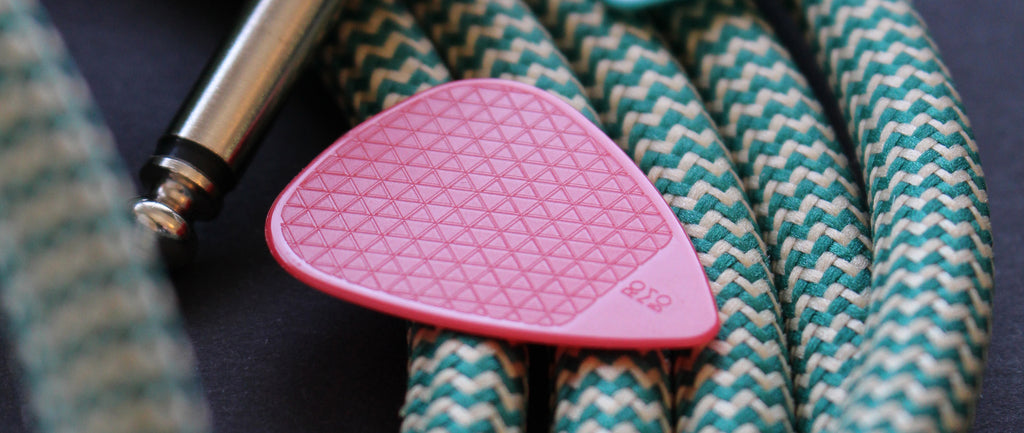
Rounded
Rounded picks provide a more warm sound and smooth attack. These are for the bass players looking for a way to play the bass strings with less force and attack. Sometimes they are totally free when a teardrop pick is completely worn down.
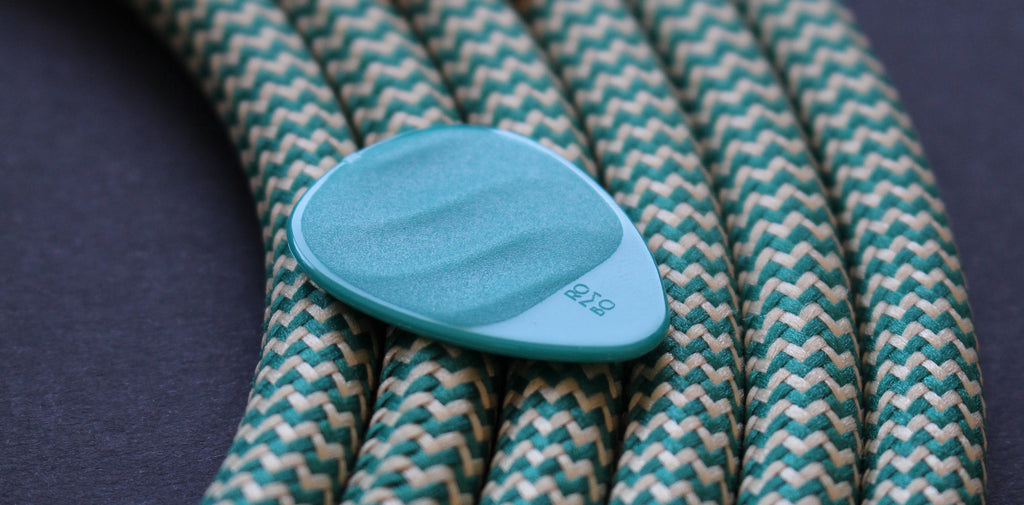
Triangle
A triangle pick is the most practical option because of the tri-sided feature. You can pluck your string with any of the three pointy tips this pick provides. A triange pick is recommended for those players who constantly break the tips of their picks.

Pick Materials for Bass Players:
When it comes to bass, we apply the same rules as with guitar picks.
After studying the physics of guitar picks, and all the material possibilities we have, we came to the following conclusions. The pick material should:
- feel nice to the touch and be comfortable, yet provide grip
- be able to create clear tones, without compromising the bass tones
- be very versatile: feel flexible when thin, and feel stiff when thick
- be durable
- look nice

You can read all about materials used at Rombo HERE.
You will also find a link with the information about Eco-Black - These picks made out of 100% recycled fibre waste, that we manufacture ourselves.
The durability of Bass Picks:
Because the strings are thicker, and bass players tend to play with more energy, the lifetime of your pick will be substantially reduced.
A way to reduce the wear and tear of picks for bass is:
- Using thicker picks
- Using harder materials
- Using picks with polished tip
- Using triangle picks (3 tips take longer to wear down).
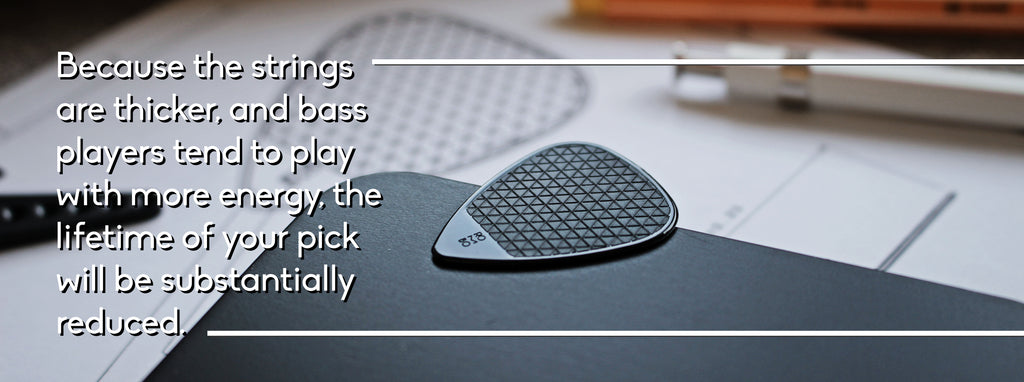
Conclusion:
Playing bass with a pick is as valid as using your fingers, if this is the tone you are looking for.
Finding a pick you are comfortable with, is a difficult task, but testing lots of them and recording some of your bass lines can help you find a balance between the tone you want, and the feel and feedback you wish from the pick.
In picks, qualities like thickness, material, shape, and size play a pivotal role in tone, feedback, grip, pick noise, sustain, etc... Music is about staying dynamic and monotony kills dynamic. Therefore, the most logical step for you is to explore enough to understand as many aspects of the bass as possible.
This applies to guitar gear in general (including picks, strings, cables, etc...) and your practice habits, style preferences, and your own psychological bias/barriers.
Sometimes the best place to start is testing a Variety Pack

- Shop
- Dealers
- Legal Notice
- Terms of Service
- Refund Policy
- Shipping
- Privacy Policy
- Contact us
- Press
- FAQ
Sign up to get the latest on sales, new releases and more…
By signing up you agree to our privacy policy.
© 2024 ROMBO.
registered brand
Powered by Shopify

